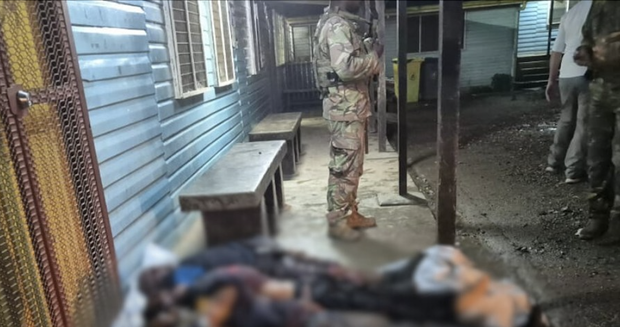PNG expands Enga ‘state of emergency’ after 6 die in revenge killing
2024.10.23
Port Moresby, Papua New Guinea and Sydney, Australia
 A PNG Defense Force soldier stands guard over the victims of a revenge shooting, pictured at Wabag General Hospital, Papua New Guinea, on Oct. 22, 2024.
A PNG Defense Force soldier stands guard over the victims of a revenge shooting, pictured at Wabag General Hospital, Papua New Guinea, on Oct. 22, 2024.
At least six people died in a “revenge killing” in Papua New Guinea’s volatile highlands region when gunmen opened fire on a bus carrying more than two dozen passengers, police said Wednesday.
Following the latest spate of tribal-related violence in Enga province an existing state of emergency will be expanded along the Highlands Highway to take in four more districts, Prime Minister James Marape said.
He has ordered security forces to make arrests instead of acting as mediators in the conflict.
Armed men from the Lyain clan ambushed the bus as it traveled along the remote highway in the country’s rugged interior on Tuesday afternoon, Acting Assistant Commissioner of Police Western End Joseph Tondop said.
“Six passengers, all male including the driver, died at the scene from the indiscriminate shooting, two are on life support at Wabag hospital and more than 17 are unaccounted,” he said in a statement.
“It is unclear whether they are still alive, wounded and hiding in the bushes or sheltering with neighboring clans.”
Videos circulating on social media appear to show blood-soaked bodies strewn throughout the bus and windows shattered by bullets.
The deaths are the latest example of PNG’s tenuous grip on stability, especially in its conflict-prone highlands region that runs west to southeast along the central part of the country.
Dozens of people have been killed and tens of thousands displaced this year in Enga province alone.
Tondop said the latest incident was part of a series of tit-for-tat tribal killings that had claimed the lives of 10 people along the highway since Friday last week, all of which were connected to a death in March.
“This sort of revenge killing is unheard of in the history of tribal conflicts in Enga province where innocent people unrelated to the conflicts were killed,” Tondop said, adding five clans were involved in the violence.
Police will intensify patrols along the highway and have imposed an overnight curfew to restrict vehicle movement for the next month, he added.
Marape said he would introduce a “domestic terrorism bill” to parliament in November, which would give more power to law enforcement agencies and allow the use of drones and other available technology to contain violence.
“This bill will give wide-ranging powers to police and those called upon in policing duties, whether from the military or elsewhere, for search and rapid-fire response, and for the protection of police and all agencies of state who are participating in law enforcement,” he said in a statement.
Violence in Enga province is becoming more frequent and lethal, according to an analysis by humanitarian group ACAPS.
In a report published this month, it found violent incidents in Enga grew from fewer than 10 in 2021 to around 50 last year, with casualties rising from around 50 to 220 over the same period.
The situation has worsened since the beginning of 2024, with an uptick in conflict between illegal miners and landowners around the Porgera gold mine and a massacre in February that ranks as one of the deadliest incidents in recent highlands’ history.
The ACAPS report said that while tribal identities play a part in the escalating violence, other factors such as national politics, poverty, crime and conflict over natural resources were also contributing factors.
The way warfare is being waged is also changing due to a breakdown in traditional tribal social structures, PNG’s growing youth population and new technologies, it said.
Nearly 65% of the population in the highlands region was under the age of 18 in June 2024.
“These changing norms and structures have contributed to conflicts that do not adhere to traditional understandings of permissible methods and targets of violence,” ACAPS said.
In recent years, violent clashes in the highlands have become more lethal due to an influx of modern automatic weapons. Policing resources, however, have not kept pace.
For communities already disadvantaged by their geographical remoteness, the violence is stoking a dire humanitarian situation by compromising access to basic services, including healthcare and education, the ACAPS assessment said.







